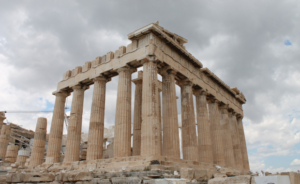This just in: The recession in the European Union is over.
But if you’re a citizen of those countries hit hardest by the financial crisis, you’re pain hasn’t yet let up.
http://www.beaumontenterprise.com/news/world/article/Eurozone-recession-end-is-cold-comfort-for-Greece-4731488.php
I get that the Germans, French and even the Italians are faring better these days. Their economies grew for the second quarter in a row, prompting EU economists to declare the recession to be over.
The story in Greece and Spain, for example, is quite different.
Let’s look at Greece, my ancestral home that became an international laughingstock when the financial crisis nearly took it down.
The Greek economy is still in the tank, down about 24 percent since 2008; just in the past year alone, it shrank 4 percent. Unemployment is about 25 percent, nearly as bad as Spain, which has Europe’s worst unemployment rate. Barry Bosworth of the Brookings Institution describes the Greek economic condition as far worse than a recession. “It goes way beyond anything that looks like a recession,” he said. “It’s absolutely appropriate to refer to Greece as in a depression.”
***
This characterization hurts me at a personal level.
I’ve visited Greece three times: twice with my wife in 2000 and 2001, and again by myself in 2003. It’s a magical place. My three visits there came as the country was preparing to play host to the 2004 Summer Olympics. They cleaned up Athens, scrubbed the graffiti off building walls and highway overpasses, built a sparkling new airport, constructed a state-of-the-art subway system and, in general, presented themselves as more than ready to host such a magnificent worldwide event.
But they did it on borrowed money. They went into hock up to their armpits … and then the bills came due.
I’m not sure the Euro recession is as “gone” as the EU folks say it is. Another hiccup in Greece, or Spain, or Portugal – where the recession/depression is lingering – could send the continent into another tailspin.
I keep thinking of when I walked to the top of the Acropolis in 2000 and stood in front of the Parthenon. My thoughts were of enormous pride that my ancestors were able to build such structures and were able to produce great genius.
If only they could revive that brilliance and find a way out of the economic mess that is largely of their own making.
